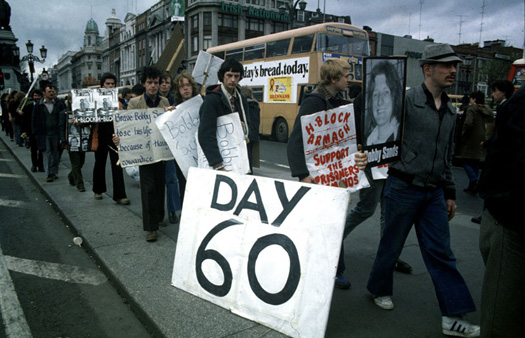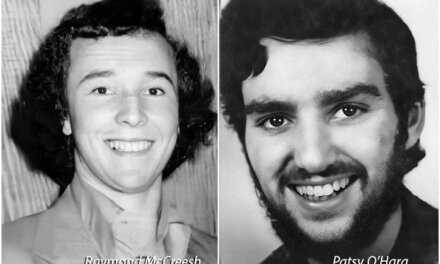 The Church of Ireland report, which was covered in the main newspapers in Ireland, interviewed Protestants living in the Clogher Diocese about the Troubles. It has recommended more be done to deal with the legacy of pain in the area’s Protestant community. The study was funded by the Irish government and the International Fund for Ireland to help develop Protestant communities in cross-border areas. Among its findings it said:
The Church of Ireland report, which was covered in the main newspapers in Ireland, interviewed Protestants living in the Clogher Diocese about the Troubles. It has recommended more be done to deal with the legacy of pain in the area’s Protestant community. The study was funded by the Irish government and the International Fund for Ireland to help develop Protestant communities in cross-border areas. Among its findings it said:
“Many Protestants and unionists saw it [the election], both then and now, as a clear and unambiguous vote of support for the retention of the ‘armed struggle’ and the purging of Protestants from the land. They couldn’t understand it then and they still can’t. The collective ‘nailing of the colours to the mast’ was stark and shocking, but made things very clear – whatever about our previous neighbourliness, whatever about our friendly and co-operative arrangements, all of that is now over.”
The response from the Secretary of the Trust, Danny Morrison, was published in the ‘Irish News’ on 7th October, 2008, both as a news item and in the Letters to the Editor. It said:
I do not wish to diminish their [the Protestants’] or their community’s real suffering during the conflict or how those in border areas perceived their isolation and vulnerability against a backdrop of IRA activity.
However, I do believe that with the passage of time all sides and those caught up in the conflict should be capable of reflecting and reasoning more dispassionately and more honestly about events and how their counterparts, the ‘other side’, might have felt.
The report, in particular, refers to the election of Bobby Sands in 1981:
“Many Protestants and unionists saw it, both then and now, as a clear and unambiguous vote of support for the retention of the ‘armed struggle’ and the purging of Protestants from the land. They couldn’t understand it then and they still can’t. The collective ‘nailing of the colours to the mast’ was stark and shocking, but made things very clear – whatever about our previous neighbourliness, whatever about our friendly and co-operative arrangements, all of that is now over.”
It is a complete distortion to say that the nationalist people in Fermanagh and South Tyrone by voting for Bobby Sands voted for armed struggle. That charge was made at the time in a crude effort by unionist and British politicians to intimidate the nationalist electorate into voting for a candidate acceptable to unionists or face being demonised. At no time after that election did republicans interpret the vote for Bobby Sands as a vote for the IRA.
People choose to vote for particular candidates for a variety of reasons. But in this bye-election one of the candidates was on hunger strike whose life might be saved if a solution was found. He was on hunger strike as a last resort because the authorities refused to engage or talk.
So, by peaceful expression, through the ballot box, people voted for Bobby Sands to encourage the British government to compromise and negotiate with the prisoners. Surely, from a unionist perspective, this was preferable to people – out of frustration – opting for armed struggle?
Under the legislation that convicted Bobby Sands and his comrades scheduled offences were defined as “the use of violence for political ends”. After ten prisoners had died the British government gave back to the prisoners the political status it had taken away in 1976 and which was the cause of five years of conflict in the jails. That the prisoners were political was again conceded by the British government when they were given early release [‘amnestied’] under the Belfast Agreement.
The lesson surely to be learned from 1981, and from the wider conflict, is that the sooner people engage in dialogue and attempt to understand the position of their opponents then the sooner is the prospect of peace and mutual accommodation.
The election of Bobby Sands in 1981 was a pivotal moment in our history and a positive development, thanks to the people of Fermanagh and South Tyrone. Had Mrs Thatcher accepted Bobby Sands’ mandate things would have turned out quite differently.
The response from the Secretary of the Trust, Danny Morrison, was published in the ‘Irish News’ on 7th October, 2008, both as a news item and in the Letters to the Editor. It said:
I do not wish to diminish their [the Protestants’] or their community’s real suffering during the conflict or how those in border areas perceived their isolation and vulnerability against a backdrop of IRA activity.
However, I do believe that with the passage of time all sides and those caught up in the conflict should be capable of reflecting and reasoning more dispassionately and more honestly about events and how their counterparts, the ‘other side’, might have felt.
The report, in particular, refers to the election of Bobby Sands in 1981:
“Many Protestants and unionists saw it, both then and now, as a clear and unambiguous vote of support for the retention of the ‘armed struggle’ and the purging of Protestants from the land. They couldn’t understand it then and they still can’t. The collective ‘nailing of the colours to the mast’ was stark and shocking, but made things very clear – whatever about our previous neighbourliness, whatever about our friendly and co-operative arrangements, all of that is now over.”
It is a complete distortion to say that the nationalist people in Fermanagh and South Tyrone by voting for Bobby Sands voted for armed struggle. That charge was made at the time in a crude effort by unionist and British politicians to intimidate the nationalist electorate into voting for a candidate acceptable to unionists or face being demonised. At no time after that election did republicans interpret the vote for Bobby Sands as a vote for the IRA.
People choose to vote for particular candidates for a variety of reasons. But in this bye-election one of the candidates was on hunger strike whose life might be saved if a solution was found. He was on hunger strike as a last resort because the authorities refused to engage or talk.
So, by peaceful expression, through the ballot box, people voted for Bobby Sands to encourage the British government to compromise and negotiate with the prisoners. Surely, from a unionist perspective, this was preferable to people – out of frustration – opting for armed struggle?
Under the legislation that convicted Bobby Sands and his comrades scheduled offences were defined as “the use of violence for political ends”. After ten prisoners had died the British government gave back to the prisoners the political status it had taken away in 1976 and which was the cause of five years of conflict in the jails. That the prisoners were political was again conceded by the British government when they were given early release [‘amnestied’] under the Belfast Agreement.
The lesson surely to be learned from 1981, and from the wider conflict, is that the sooner people engage in dialogue and attempt to understand the position of their opponents then the sooner is the prospect of peace and mutual accommodation.
The election of Bobby Sands in 1981 was a pivotal moment in our history and a positive development, thanks to the people of Fermanagh and South Tyrone. Had Mrs Thatcher accepted Bobby Sands’ mandate things would have turned out quite differently.
Danny Morrison, Secretary Bobby Sands Trust.



